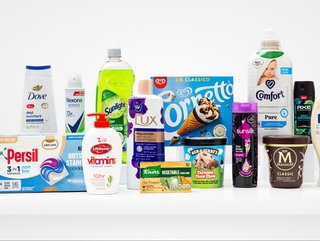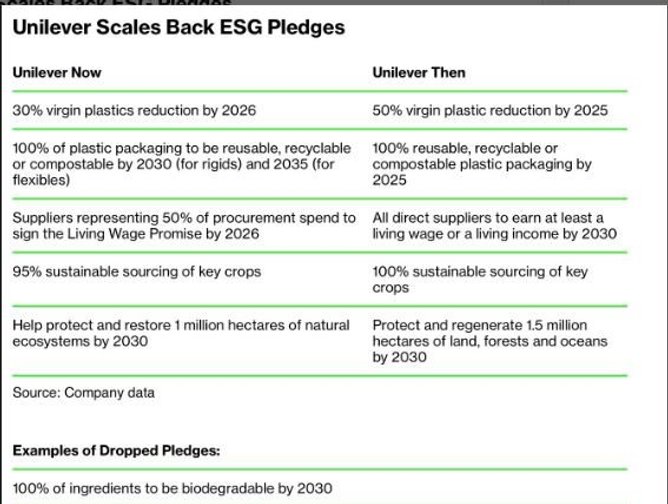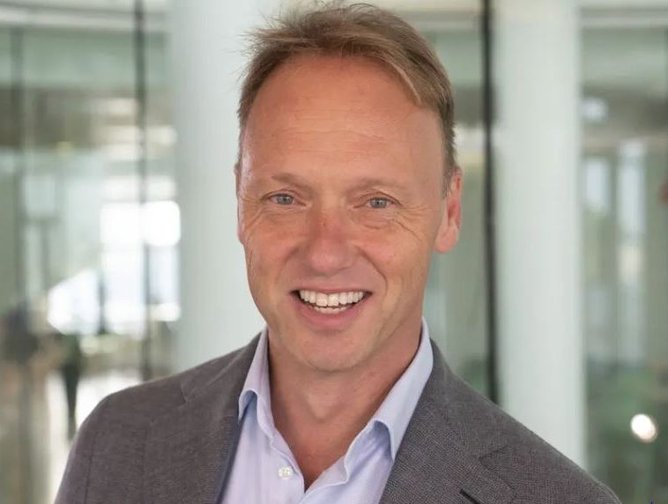Is Unilever’s ESG Rethink Good Business or Green Betrayal?

Unilever has built a reputation as one of the darling’s of the corporate green movement.
But today, many people are asking whether the reputation was built on sand.
For, to the surprise of many and the anger of many more, new Unilever CEO Hein Schumacher announced a scale-back of its environmental and social aims, watering down targets in areas including plastic usage and pay.
Under the provocative headline: ‘Defining a new era for sustainability leadership’, Hein says: “The reality is that Unilever’s sustainability agenda covers a wide range of issues.
“But we have learned from experience that we need to be more focused in our allocation of resources to make tangible progress on the big, complex challenges we face.”

What does it mean for Unilever’s ESG targets?
As the above table shows, there are some significant areas of deceleration.
For example, Unilever, one of the largest users of plastic packaging in the world, had promised to halve its use of virgin plastics by 2025.
Now, it will target a reduction of a third by 2026 – equating to about 100,000 tonnes more fresh plastic every year.
The company is also dropping a promise to spend US$2.1bn a year with diverse businesses by 2025.
‘Hang their heads in shame’
Unsurprisingly, the major corporations are not allowing themselves to be drawn to comment on Unilever. After all, it does not do to be seen as throwing stones from inside a glasshouse.
Climate groups are less coy.
“Climate change and plastic pollution are not going away anytime soon and huge food companies like Unilever will also feel their very real-world impacts,” says Nusa Urbancic, CEO of the Changing Markets Foundation NGO.
“The commitments that they decided to weaken were designed to tackle some of the most important material challenges for the sector.”
Greenpeace UK’s Plastics Head Nina Schrank said the company’s executives “should hang their heads in shame”.
Nina added: “Hein Schumacher and his board are well aware of the ruinous impact of their plastic pollution.
“The tsunami of plastic they produce each year meant their existing targets were already not fit for purpose. We needed much more. And so rather than doubling down, they’re quietly dressing up their backpedalling and low ambition as worthy pragmatism.”

What exactly is Hein Schumacher announcing?
Unilever’s CEO says its approach to ESG needs to “evolve” and adds that it will be pinned on three areas:
- “To be more focused in allocating our resources towards our biggest sustainability priorities
- “To be more urgent in driving actions towards our long-term ambitions
- “To be more systemic in our advocacy to address the enablers and blockers of progress outside of our direct control.”
He adds: “Our updated commitments are very stretching, but they are also intentionally and, unashamedly, realistic.
“We are determined that Unilever will deliver against them, just as we are determined to perform against our financial goals.
“We want to set sustainability ambitions which are credible, which we believe we can deliver against, and which have real positive impact.”
About Unilever
UK-based Unilever is a huge global company, ranked at 104 in the 2023 Forbes Global 2000.
It produces brands including Ben and Jerry’s, Hellmann’s, Domestos, Cif, Dove, Vaseline and Knorr.
Statistics include:
- 128,000 global employees
- 280 factories
- 57,000 suppliers in 150 countries
- AAA- 2023 rating in CDP forests, water and climate
- A 74% reduction in GHG emissions in its operations since 2015.
Is pragmatism the right approach?
The shift comes amid growing pressure from shareholders in global corporations to cut costs and focus more on stock market performance than ESG.
Alison Taylor, Clinical Professor at NYU Stern School of Business, believes Hein has got it right.
She says: “Actually, I use Unilever’s old materiality map in class as an example of baggy, vague, over ambitious goals and self-aggrandising commitments that make little sense and falsely suggest a mayonnaise and soap company can solve intractable societal problems.”
Alison adds: “More sober, restrained, realistic commitments on fewer issues that the company can actually influence is good news, especially combined with a recent focus on policy alignment.
“And the common practice of setting flagship goals, then hoping no one notices when you miss them, then setting new ones a year later, needs to go away too.”
She concludes by saying: “Corporate responsibility as PR is over”.
Which begs the question: does that apply to PR that portrays watered-down ESG targets as ‘corporate responsibility’?
******
Make sure you check out the latest edition of Sustainability Magazine and also sign up to our global conference series - Sustainability LIVE 2024
******
Sustainability Magazine is a BizClik brand
******






